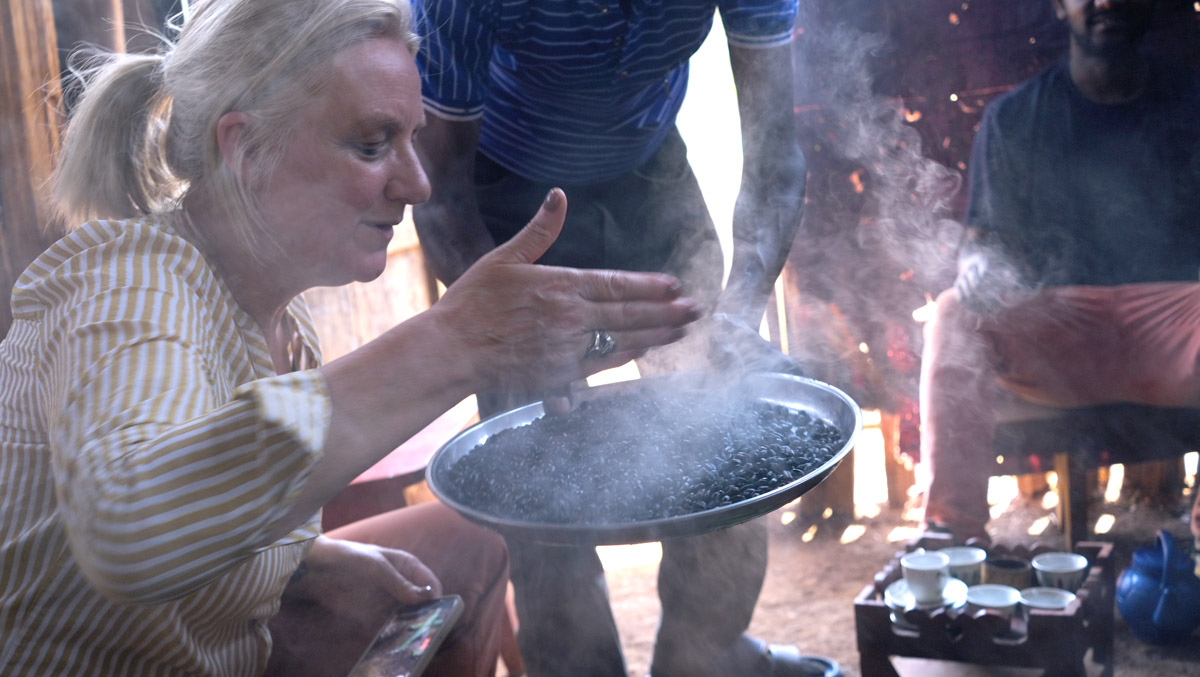The Sacred Fire
Discovering Coffee's Ancient Heart in Bonga
I The Invitation
We’d followed coffee’s trail to Bonga, Ethiopia—what everyone insisted was its absolute beginning. Not just another coffee region, but the birthplace where coffee first grew wild in ancient highland forests. But standing outside Beranu’s modest home, breathing highland air thick with wood smoke, we realised we had no idea what we were walking into.
Our guide Bereket had delivered the invitation that morning with casual significance: “Beranu invites you for coffee ceremony with his wife Demekeeh. Very traditional. Very important if you want to understand coffee here.”
We eagerly accepted, our minds conjuring familiar scenarios—perhaps we’d discuss flavour profiles, learn processing methods. How different could Ethiopian coffee culture be from what we’d experienced elsewhere?
But as Bereket led us through Bonga’s winding paths, past homes where smoke drifted from doorways and children played between coffee trees that grew wild at the forest edge, we began to suspect we were walking toward something that would challenge our entire understanding of “coffee culture.”
“How long does the ceremony usually take?” Alice asked, thinking about our afternoon plans.
Bereket’s patient smile carried the weight of countless similar conversations with time-conscious visitors. “Depends. Maybe three hours. Maybe longer. You cannot rush what has been done this way for many, many generations.”
Three hours. For coffee. We exchanged glances carrying all our unspoken assumptions about efficiency—assumptions that had been systematically dismantled by every authentic cultural encounter since leaving London’s coffee shops behind.
Standing at Beranu’s doorway, we felt the familiar excitement mixed with complete disorientation that had become the signature of our most meaningful discoveries.
II Meeting the Keepers
Beranu appeared with the unhurried presence of someone completely comfortable in his world. His weathered hands spoke decades of highland cultivation, and he greeted us with hospitality that felt both formal and genuinely warm.
“You want to understand Ethiopian coffee?” he asked in careful English, gesturing us inside. “First, you must understand coffee ceremony. Without ceremony, coffee is just drink. With ceremony, coffee becomes something else entirely.”
Inside, we found Demekeeh moving with practiced grace around objects that looked simultaneously familiar and foreign. She wore a traditional green dress with delicate patterns, her movements deliberate as someone who had performed these exact actions countless times.
“Demekeeh will teach you,” Beranu explained, settling onto a low wooden stool. “She learned from her mother, who learned from her mother’s mother. This knowledge passes only this way.”
Bereket positioned himself where he could translate not just words but context—the cultural significance that might escape visitors like us. We began to understand he wasn’t just showing us around, but facilitating something that required careful navigation between worlds.
Demekeeh knelt beside her preparations: green coffee beans, shallow pan, elegant clay pot with curved spout, tiny cups on carved wooden tray. But what struck us wasn’t the equipment—it was her reverence. She approached this as ritual, elevating each movement into something sacred.
We watched, mesmerised, as she began selecting individual beans with complete focus, examining each one before she included it or set it aside.
“She chooses only perfect beans for guests,” Bereket translated quietly. “She examines each bean. Only the best for ceremony.”
Watching Demekeeh’s meticulous selection, we realised we were witnessing something that existed in a completely different relationship with time than anything we’d experienced around coffee before.
"First, you must understand coffee ceremony. Without ceremony, coffee is just drink. With ceremony, coffee becomes something else entirely."
— Beranu, Farmer
Join Alice & Nick's Next Adventure
Get exclusive access to our discoveries, behind-the-scenes expedition updates, and coffee from the communities we visit.
Taste this Coffee20% of every subscription directly funds community projects with our producer partners.
III Coffee's Blessing
What happened next shattered every assumption we held about coffee preparation. Demekeeh placed her selected green beans in the shallow pan over glowing coals, and suddenly the room filled with smoke that carried a scent we had no words for.
This wasn’t the familiar aroma we knew as roasted coffee. This was something alive and wild—earthy, grassy, almost floral—like breathing the essence of an entire forest.
“She roasts very slowly,” Bereket said quietly. “She must listen to the beans, smell when they’re ready. She cannot rush.”
Then Demekeeh did something unexpected: she lifted the pan of roasting beans and carried it toward us, letting fragrant smoke wash over our faces.
“Coffee smoke blesses everyone,” Beranu explained. “It brings good spirit, brings people together. Everyone must breathe coffee before ceremony can continue.”
As the smoke enveloped us—warm, complex, unlike anything we’d inhaled—we realised we weren’t just watching. We were becoming part of something that connected us to everyone in the room and possibly generations who had breathed this same blessing.
The roasting continued with hypnotic rhythm. Demekeeh moved with economical but graceful gestures, timing each adjustment to knowledge we couldn’t access. We watched, completely absorbed, as the beans transformed from green to gold to rich brown.
Even when she’d fully roasted the beans, they weren’t ready. Demekeeh began grinding them by hand, her repetitive motion creating rhythm that seemed to slow time itself.
“In Addis Ababa,” Beranu said, watching us watch his wife’s methodical work, “people buy coffee already ground, very convenient. But ceremony cannot be convenient. Community cannot be rushed.”
Alice suddenly wondered aloud: “Has the ceremony always been like this? Even during… difficult times?”
Beranu’s expression shifted slightly. “Coffee ceremony survived many troubles. Even when others tried to change our ways.”
Something in his tone suggested stories we didn’t know—stories about resistance and persistence we’d never considered.
Coffee smoke blesses everyone
— Beranu, Farmer

IV The Original Recipe
When Demekeeh finally began brewing in the elegant clay pot—the jebena—we’d already spent over two hours in that space. But somehow time had stopped feeling like something we needed to manage. The process had become meditation that made our usual coffee routine seem almost violent in its efficiency.
Then she began pouring. Dark coffee arced gracefully from the jebena’s narrow spout into tiny cups. But this wasn’t just pouring—this was artistry. She poured from impossible height, liquid flowing in perfect stream that never missed its target.
“Look at the foam,” Bereket said quietly, as each cup filled with coffee that wore a crown of delicate golden foam.
“The foam’s beautiful,” Alice said. “Does it have meaning beyond skill?”
“Very important,” Beranu nodded. “My grandfather said coffee foam carries prayers. Long ago, holy men used coffee for night prayers, said foam lifted prayers to heaven.”
We stared at the foam with new understanding, sensing layers of spiritual significance we’d never imagined.
When Demekeeh offered us the first cups, her eyes meeting ours with quiet pride, we understood she wasn’t just serving coffee. She was welcoming us into something ancient. The first sip carried flavors unlike any coffee we’d experienced—complex, earthy, alive.
“This taste,” Nick said, struggling for words. “It’s like nothing we’ve had before.”
“This is original coffee,” Beranu smiled. “Same as our ancestors first drank. Before coffee went anywhere else, this is how it was.”
We sat holding our cups with new reverence, understanding we’d experienced coffee the way people had meant it to be—not as caffeine delivery, but as sacred act that created community through shared ritual and time.
This is original coffee, same as our ancestors first drank. Before coffee went anywhere else, this is how it was."
— Beranu, Farmer
V The History we Almost Lost
As we sat in the lingering warmth of the completed ceremony, our minds spun with questions we hadn’t known to ask hours earlier.
“How did this develop?” Nick asked. “When did coffee transform from forest plant into this sacred practice?”
Bereket translated our curiosity to Demekeeh, opening up layers of mystery we’d never anticipated.
“She says ceremony is older than her grandmother’s grandmother’s memory,” Bereket interpreted. “Maybe one thousand years, maybe more. Coffee and ceremony grew up together.”
“Are there records of this?” Alice asked. “Do historians study the ceremony?”
Bereket shook his head. “Only recently outside world pays attention. UNESCO just recognised coffee ceremony as world heritage, but we always knew it was important.”
The gap felt familiar from our coffee investigations. Academic attention had focused on coffee as commodity, but coffee as sacred practice remained largely untold.
“Each region different,” Bereket explained. “Ceremony in Harari different from Sidama, different from Oromo. Same spirit, different traditions. Very complex, very old.”
As our time drew to a close, we found ourselves carrying questions that felt both urgent and impossible to answer quickly. How do you trace traditions that exist primarily in practice? What happens when ceremonial knowledge depends on unbroken transmission chains that might not survive modernisation?
We walked back through Bonga’s highland paths, carrying coffee’s blessing in our lungs and questions in our minds that would lead us toward months of investigation. We’d experienced something ancient and profound, but we’d also glimpsed how much of coffee’s deepest history remained unexplored, undocumented, and potentially vulnerable to disappearing without anyone outside these communities knowing what they might lose.
Ceremony is older than her grandmother's grandmother's memory, maybe one thousand years, maybe more. Coffee and ceremony grew up together.
— Demekeeh
